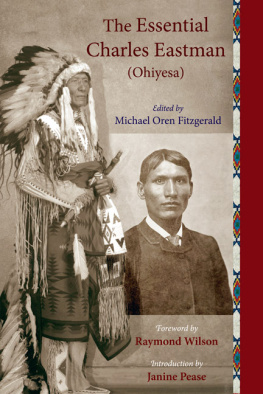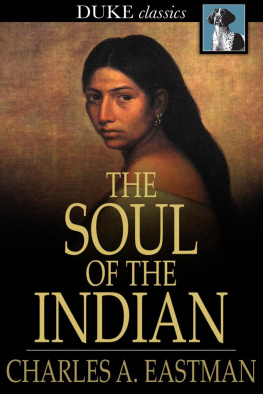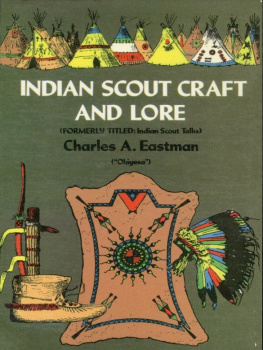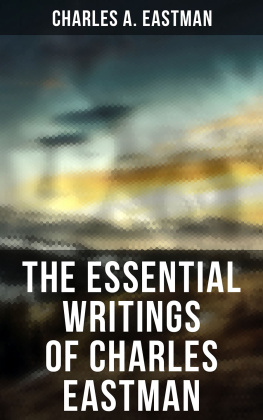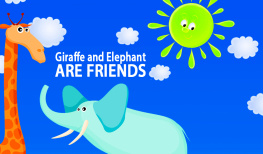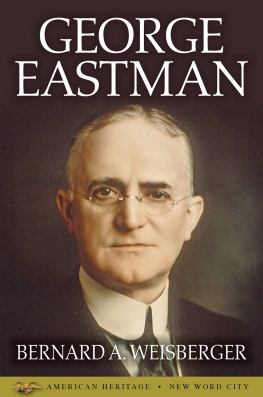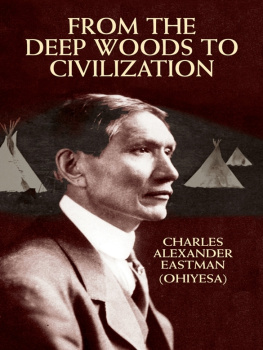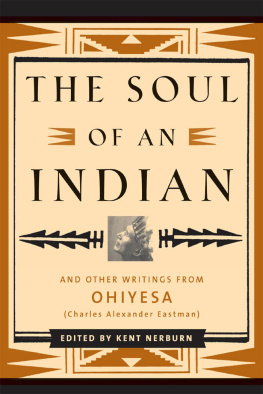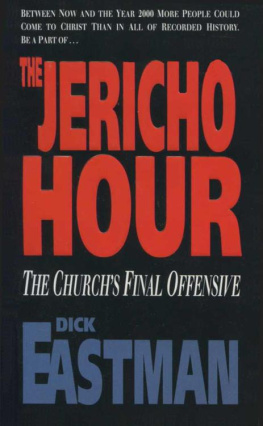About This Book
[This book] gives first person narrative to the life of the Dakota, as if you had just been there. Eastmans voice is unfettered by the bias of hindsight or values laden from other times or faiths. This work is a gift of major proportion, to a world in need of gifts, especially those spiritual.... We are grateful for the thoughtful selections from Ohiyesas work.
Janine Pease, founding president of the Little Big Horn College, and past president of the American Indian Higher Education Consortium
Michael Fitzgerald has captured the essence of Charles Eastmans writings, focusing on selections from his four best books.... Eastmans words provide his important views regarding Indian and white relations.
Prof. Raymond Wilson, Fort Hays State University
The Essential Charles Eastman is the only modern collection of Eastmans most important writings, and Fitzgerald edited it with a careful attention to the complex deployments Eastman makes of his various identities as well as a sympathetic ear to Eastmans voice, aspirations, and frustrations.
Prof. Stephen Brandon, University of New Mexico
Michael Fitzgeralds choices represent the pinnacle of Eastmans intent to enlighten and harmonize the disparate elements of these two diametrically opposed, yet convergent cultures: Native America and post-Colonial Civilization. I sincerely recommend The Essential Charles Eastman for any educator or interdisciplinary course in which critical comprehension of pan-historic and multi-cultural ideology is vital.
Prof. Gerald Musinsky, Temple University
Other Books by Michael Oren Fitzgerald
Yellowtail: Crow Medicine Man and Sun Dance Chief, University of Oklahoma Press, 1991
Light on the Indian World: The Essential Writings of Charles Eastman (Ohiyesa), by Charles Eastman edited by Michael O. Fitzgerald, World Wisdom, 2002
The Foundations of Christian Art: Illustrated, by Titus Burckhardt, edited by Michael Oren Fitzgerald, World Wisdom, 2006
The Spiritual Legacy of the American Indian: Commemorative Edition with Letters While Living with Black Elk, by Joseph Epes Brown, co-edited by Michael Oren Fitzgerald, World Wisdom, 2007
Native Spirit: The Sun Dance Way, by Thomas Yellowtail, edited by Michael Oren Fitzgerald, World Wisdom, 2007
Introduction to Hindu Dharma: Discourses by the 68th Jagadguru of Kanchi, edited by Michael Oren Fitzgerald, World Wisdom, 2008
Other Books by Judith Fitzgerald and
Michael Oren Fitzgerald
Christian Spirit, World Wisdom, 2004
{Awarded best book on Religion and Philosophy2004 by MIPA}
Indian Spirit: Revised and Enlarged, World Wisdom, 2006
The Sermon of All Creation: Christians on Nature, World Wisdom, 2005
{Merit Award Winner for Religion and Philosophy 2005 by MIPA}
{Merit Award Winner for Nature2005 by MIPA}
The Spirit of Indian Women, World Wisdom, 2005
{Awarded best book on Religion and Philosophy2005 by MIPA}
{Awarded best book on Multi-Cultural2005 by MIPA}
The Universal Spirit of Islam, World Wisdom, 2006
The Spirit of Muhammad: From Hadith, World Wisdom, 2008
Films Produced by Michael Oren Fitzgerald
Native Spirit & The Sun Dance Way, World Wisdom, 2007
{Offical Selection Montreal First Peoples Festival}
{Offical Selection31st Annual American Indian Film Festival}
Other American Indian Books and Films by World Wisdom
All Our Relatives: Traditional Native American Thoughts about Nature, ompiled and illustrated by Paul Goble, 2005
The Essential Charles Eastman (Ohiyesa): Light on the Indian World, by Charles Eastman (Ohiyesa), edited by Michael Oren Fitzgerald, 2007
The Feathered Sun: Plains Indians in Art and Philosophy by Frithjof Schuon, 1990
The Gospel of the Redman: Commemorative Edition, compiled by Ernest Thompson Seton and Julia M. Seton, 2005
Indian Spirit: Revised and Enlarged, edited by Judith Fitzgerald and Michael Oren Fitzgerald, 2006
Native Spirit: The Sun Dance Way, by Thomas Yellowtail, edited by Michael Oren Fitzgerald, World Wisdom, 2007
Native Spirit & The Sun Dance Way, directed by Jennifer Casey, produced by Michael Oren Fitzgerlad, World Wisdom, 2007
The Spirit of Indian Women, edited by Judith Fitzgerald and Michael Oren Fitzgerald, 2005
The Spiritual Legacy of the American Indian: Commemorative Edition with Letters While Living with Black Elk, by Joseph Epes Brown, co -edited by Michael Oren Fitzgerald, 2007
Tipi: Home of the Nomadic Buffalo Hunters , by Paul Goble, 2007
Biographical Notes
About Ohiyesa
Ohiyesa (Charles Alexander Eastman) was born in a buffalo hide tipi near Redwood Falls, Minn., in the winter of 1858. His father, Many Lightnings (Tawakanhdeota), was a full-blood Sioux. His mother was the granddaughter of the Sioux Chief Cloud Man and the daughter of Stands Sacred (Wakan inajin win) and a well-known army officer, Seth Eastman. His name at birth was Hakadah, the pitiful last, because he became the last of his three brothers and one sister when his mother died shortly after his birth. In his early youth he received the name Ohiyesa (The Winner).
The baby was initially raised in his homeland of Minnesota by his grandmother. At the age of four, the socalled Sioux Uprising of 1862 occurred and he became separated from his father, elder brothers and only sister, whom the tribe thought had been killed by the whites. Hakadah fled into exile in Manitoba with the remaining members of his band of Santee Sioux. For the next eleven years he lived the original nomadic life of his people in the care of his uncle and his grandmother. His uncle was a prominent hunter and warrior and gave the youth, now named Ohiyesa, the complete training necessary to carry on the nomadic tribal heritage, including all of the secrets of virgin nature. Both his uncle and grandmother instilled in him the spiritual philosophy of the Indian. Ohiyesa always regarded this period of his life as his most important education.
At fifteen, Ohiyesa had just entered Indian manhood and was preparing to embark on his first war-path to avenge the reputed death of his father, when he was astonished by the reappearance of his father. The young man learned that this father had adopted the religion and customs of the hated race, and was come to take home his youngest son.
His father was part of a small group of progressive Indians who earned a living with a combination of farming and ranching on homesteads in Flandreau, Dakota Territory. After Ohiyesas first experience with a mission day school, he contemplated rebelling and leaving his new log home to return to the wild and his native ways. However after a long discussion with his father, he cut his long hair, began to wear white mans clothing and applied himself to his new school life. He soon overcame his reluctance, although not his unhappiness with his new world, and two years later walked 150 miles to attend a better school at Santee, Nebraska. In this larger school he made rapid progress and upon the recommendation of his teacher, the renowned missionary educator, Dr. Alfred L. Riggs, Ohiyesa was accepted at to the preparatory department of Beloit College, Wisconsin. His father had adopted the English name of his wifes father, Eastman, so the boy now named himself Charles Alexander Eastman.
Ohiyesa, now primarily known as Charles Eastman, spent two years at Beloit College before successively going to Knox College, Ill.; then Kimball Union Academy in New Hampshire, and finally to Dartmouth College. He graduated from Dartmouth in 1887, and then studied medicine at Boston University, where he graduated in 1890 as orator of his class. He spent a total of seventeen years in primary, preparatory, undergraduate college, and professional education, which is significantly less time than is required by a typical student.

